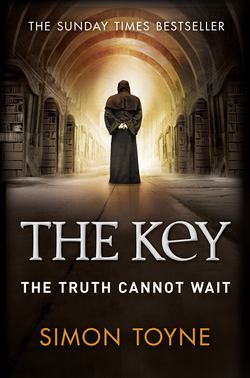Читать книгу The Key - Simon Toyne, Simon Toyne - Страница 14
7
ОглавлениеThe Citadel, Ruin
The sound of the lament hit Athanasius like a wave as he and the other heads stepped into the cathedral cave and made their way to the front. It was the one space in the Citadel big enough to house everyone, and here everyone now was, united in their grief.
At the back were the numerous grey cloaks, the unskilled monks yet to be assigned a guild, separated from the higher orders by a vivid red line of guards. The brown cloaks came next – the masons, carpenters and skilled technicians who maintained the fabric of the Citadel – so tired after the work of the past week that Athanasius could see them swaying where they stood. In front of them were the white-hooded Apothecaria, medical monks whose skills elevated them above all but the black cassocks – the spiritual guilds, priests and librarians who spent their lives in the darkness of the great library, hoarding the knowledge that had been gathered in the dark mountain since mankind first learned to write and remember.
The sound continued to pulse from the congregation as Athanasius took his place at the altar and turned to face them all. It was traditional when the Prelate, the head of the mountain order, was gathered to God that the Abbot would deliver the eulogy and assume the role of acting Prelate until an election confirmed him in the position or chose someone else. But there were two bodies lying in state below the T-shaped cross at the front of the cave: the Prelate on the left, and the Abbot on the right. For the first time in its measureless history the Citadel had no leader.
As the lament neared its conclusion, Athanasius stepped up to the pulpit carved from a stalagmite and looked over the heads of the gathered monks to the raised gallery where the Sancti – the green cloaks – usually stood, segregated from their brethren to ensure the great secrets they kept remained so. There should have been thirteen of them including the Abbot, but today the gallery was empty. In the absence of an Abbot, or a natural heir drawn from the ranks of the Sancti, it fell to the Abbot’s chamberlain to deliver the eulogy – it fell to Athanasius.
‘Brothers,’ he said, his voice sounding thin after the richness of the requiem, ‘this is a sad day for all of us. We are without a leader. But I can assure you this situation will very soon be rectified. I have consulted with the heads of each guild and we have agreed to hold elections for the office of both Prelate and Abbot immediately.’ A murmur rippled through the congregation at this news. ‘All candidates must declare themselves by Vespers tomorrow, with elections to follow two days later. Such haste has been agreed by mutual consent because of the need to re-establish order coupled with the lack of a natural heir.’
‘And why are we in this situation?’ a voice called from the middle of the congregation. ‘Who ordered the Sancti to be taken from the mountain?’
Athanasius looked towards the voice, trying to catch sight of the monk who had challenged him. ‘I did,’ he said.
‘On whose authority?’ Another voice, from further back in the massed ranks of grey cloaks.
‘I acted on the authority of my own conscience and a sense of compassion for my brother monks. The Sancti had been struck down by some sort of haemorrhagic fever; they needed urgent medical attention and the explosion had cracked the walls to provide a quick means of evacuation. Modern ambulances were waiting outside. I did not think to question this providence. I merely thanked God for it and acted quickly to save the lives of my brothers. Had the Sancti remained in the mountain, they would now be dead, of that I feel sure.’
‘And what has become of them?’ A different voice now. Athanasius paused, fearful that the whole congregation was massing against him. Since assuming caretaker responsibilities, he had been privy to the Abbot’s usual digests and communiqués from the outside world. By this method he had learned the fate of the monks he had sought to save.
‘All have died – save two.’
Another murmur rippled through the crowd.
‘Then we should await their return,’ Brother Axel called out. The noise became a rumble of approval amid a general nodding of heads.
‘I fear that is unlikely,’ Athanasius replied, addressing the congregation rather than his challenger. ‘The last remaining Sancti suffered the same affliction as the others and their condition is grave. We cannot rely on them returning or having the strength to lead if they do. We must look to new leadership. The elections are set.’
A new disturbance broke out and everyone turned towards it. A figure had entered the door at the back of the cave and was now moving steadily towards the altar, his approach accompanied by the hum of voices and a strange, dry hissing sound. It was Brother Gardener, his name earned from many years of service in the pastures and orchards that flourished at the heart of the mountain.
The dry whispering grew louder with each step and so did the murmur of voices until Brother Gardener reached the altar and grimly stepped aside to reveal the source of the noise. It was the branch of a tree, broken off at the thickest part, its leaves and blossom brown and withered.
‘I found it in the orchard under one of the oldest trees,’ Brother Gardener said, his voice low and troubled. ‘It’s rotted right through.’
He looked up at Athanasius. ‘And there’re others, lots of others; mostly the older ones but some of the younger ones too. I’ve never seen anything like it. Something’s happening. Something terrible. I think the garden is dying.’
